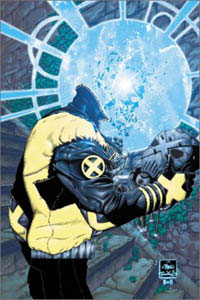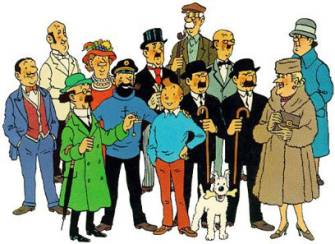via boing boing:
SomethingAwful.com holds a weekly Photoshop. This week's theme -- 'Children's book covers made demented.' All of the entries are twisted and obscene, and the best part is, half of these books would actually sell to adults!
via Nelson Guirado.com:
What's the Al Qaeda book club reading this month? American forces reportedly found this illustrated 'how-to torture' manual in a terrorist safehouse in Iraq.
via popmatters.com:
The perfect book for all those moms whose body piercings got in the way of their breastfeeding.
Saturday, May 26, 2007
Weekend Links: The Not For @#%!'n Kids Edition
Friday, May 25, 2007
Book Review: Grant Morrison's New X-Men Omnibus

Up 'til about the halfway mark, I was enjoying it simply as a much-better-than-average superhero book, but I knew that I still hadn't cracked the underlying lesson, the secret parable, what Morrison has referred to as the "inoculation of ideas" that he is trying to deliver in his comics work. So I went back to the beginning of the mammoth volume and started skipping through the pages, reading random word bubbles here and there, until it finally hit me. This book, like mutation itself, is about evolution. Not just the aforementioned 'second evolution' that changes the appearance of the Beast from a pointy-haired monster into a more feline Beauty & the Beast creature, but the evolution of the X-Men comics themselves -- and superhero comics in general.
If the way I read it was correct, Morrison appears to have devoted his entire 42 issue run on the series to questioning its relevancy, trying to put an end to the artistically repetitive rut it had fallen into, and steering it in a completely new and previously unimagined direction. (This comic book crusade must have seemed all the more gutsy and blasphemous at the time, as the X-Men comics were still the best selling comic books in America week to week!) To spur on the book's own evolution, Morrison re-introduced many of the series' more tired and/or far-fetched tropes (Professor X's intergalactic love affair, Magneto's grandiose plans to rid the Earth of humans, Wolverine's endless quest to find out his past), bringing them to their logical conclusions and thereby creating a clean slate for future writers of the series. He also took many of the one-dimensional characters and, by adding a bit of a dichotomy to their personalities, made them much more complex -- again, giving future writers any number of new themes that they might tackle should they so desire. For example, by having the Cyclops character begin to question his role as leader of the X-Men and his love for Jean Grey, Morrison has created a new cipher for thoughts on personal, romantic and group responsibility. By tossing former nemesis Emma Frost into the X-Men, issues of trust and questions as to a person's ability to truly change can now be more readily played around with. The most direct calls for the comic's continued evolution, though, come in the way that Morrison writes Wolverine's origin, the rise of the U-Men, the '150 years in the future' flashforward, and Xavier's admission that humankind will never feel safe around mutants so long as mutants insist on fighting endlessly with one another. These are used not just as plot points, but also as a subtle 'ahem' to the publishers of the series, its future writers and its current readers. Morrison seems to be saying that if you want your X-Men comics to be about more than just guys in funny costumes with funny names fighting needless battles with one another, you've gotta change your scope of expectations, expand the ideas that you allow into the stories, and update the metaphors at least as often as the costumes. In short, evolve.
evolution, though, come in the way that Morrison writes Wolverine's origin, the rise of the U-Men, the '150 years in the future' flashforward, and Xavier's admission that humankind will never feel safe around mutants so long as mutants insist on fighting endlessly with one another. These are used not just as plot points, but also as a subtle 'ahem' to the publishers of the series, its future writers and its current readers. Morrison seems to be saying that if you want your X-Men comics to be about more than just guys in funny costumes with funny names fighting needless battles with one another, you've gotta change your scope of expectations, expand the ideas that you allow into the stories, and update the metaphors at least as often as the costumes. In short, evolve.
(I plan to reread the New X-Men omnibus in a month or so. If anyone has tips as to ideas, themes, etc. that I might want to look out for on my second go-round, please drop me a note in the comments section.)
Update: The Gardner Linn Fanclub has a thorough and amazing analysis of the series. It's well worth neglecting a little more of your 'real' work to take the time to read.
For a nice, long interview with Grant Morrison, click here. You'll be re-routed to Popthought.com.
Posted by
Inkwell Bookstore
at
12:08 AM
![]()
Labels: book reviews, comic book news
Thursday, May 24, 2007
Definition of the Deckle Edge
 Big Bad Book Blog has an interesting post about the uneven, zigzag edges on certain books. She did a little investigating, and "discovered that (the) rough, untrimmed page edges are called deckle edges or just simply rough trimmed."
Big Bad Book Blog has an interesting post about the uneven, zigzag edges on certain books. She did a little investigating, and "discovered that (the) rough, untrimmed page edges are called deckle edges or just simply rough trimmed."
She also found out this little bit o' history:
"A deckle is a wood frame resting on or hinged to the edges of the mold that defines the edges of the sheet in handmade paper process. According to history.com, the rough edges are created by the fibrous pulp flowing between the frame and the deckle of the mold. When books were predominantly composed of handmade paper, deckle edges were considered a defect and were trimmed off. In the late 1800s, however, rough trimmed pages became fashionable. During this time, many books were left untrimmed on one or three sides for purely aesthetic reasons."
Is it only a matter of time before the E-books try and replicate this, as well?
Wednesday, May 23, 2007
It's The End Of E-Books As We Know Them! (Oh, Wait...You Weren't Aware Of Them Yet? Nevermind, Then. Skip To The Next Post)
 Walk into almost any bookstore around the world and bring up the subject of E-books -- handheld digital devices that you can download complete books into for unlimited perusal -- and you're sure to get a promotional bookmark slashed lengthwise across your neck. While there are a million and one reasons why we refuse to believe that E-books will ever truly take off with the public ('people want to feel the sensation of turning the pages' is a tried and true stand-by), there is really only one reason we do not want them to: it threatens our livelihoods. With online bookstores already pounding nail after nail into the coffins of traditional brick & mortar shops, this new-fangled machinery only looks to make things worse.
Walk into almost any bookstore around the world and bring up the subject of E-books -- handheld digital devices that you can download complete books into for unlimited perusal -- and you're sure to get a promotional bookmark slashed lengthwise across your neck. While there are a million and one reasons why we refuse to believe that E-books will ever truly take off with the public ('people want to feel the sensation of turning the pages' is a tried and true stand-by), there is really only one reason we do not want them to: it threatens our livelihoods. With online bookstores already pounding nail after nail into the coffins of traditional brick & mortar shops, this new-fangled machinery only looks to make things worse.
That said, the damn things fascinate me in a morbid, know-in-advance-how-you're-going-to-eventually-die sort of way. I mean, it would be undoubtedly cool to have a library of your favorite books all in one small device, in much the same way that the ipod serves as a personal, portable juke-box (shout outs to all the struggling indie record stores -- we feel your pain, brothers!). Ah, but at what cost? I already step over the sleeping bodies of far too many former booksellers on the way to work every morning. One has to wonder, do the mad scientists behind these cold, unfeeling digital book machines have any moral code that they answer to?
Antonio Tombolini, an Italian internet entrepreneur, recently focused his evil genius on perfecting E-books. In an interview with Master New Media, he discusses the problems with previous attempts, as well as the advances he has been making in what he sinisterly calls, "reading devices." Booksellers can take some small solace in the fact that Tombolini wears what looks to be an orange, state prison jumpsuit in the video interview portions. If we're lucky, he won't be able to enact his plan for bookstore domination until his sentence is complete.
perfecting E-books. In an interview with Master New Media, he discusses the problems with previous attempts, as well as the advances he has been making in what he sinisterly calls, "reading devices." Booksellers can take some small solace in the fact that Tombolini wears what looks to be an orange, state prison jumpsuit in the video interview portions. If we're lucky, he won't be able to enact his plan for bookstore domination until his sentence is complete.
One Goes Through An Awful Lot Of Airsickness Bags In 25 Years Of Travel Writing
 2007 marks The Rough Guide travel series' 25th year in publishing. To commemorate the occasion, they're offering one lucky winner a complete collection of the Rough Guide reprints. To win, all you need to do is leave a comment on the Gadling Travel Blog's website, and their 'magical system will automatically select a single random winner.'
2007 marks The Rough Guide travel series' 25th year in publishing. To commemorate the occasion, they're offering one lucky winner a complete collection of the Rough Guide reprints. To win, all you need to do is leave a comment on the Gadling Travel Blog's website, and their 'magical system will automatically select a single random winner.'
While you're over there shamelessly begging for handouts, make sure to read the accompanying interview with Rough Guide founder, Mark Ellingham. He comes off as a nice, smart guy (but his library, pictured to the left, could use a little bit more variety).
Tuesday, May 22, 2007
Generically Titled Entry Featuring Nothing But Randomly Assorted Links
Oprah's dad is writing a tell-all book. I'm hoping that James Frey offers to co-author it.
Simon & Schuster to use 'American Idol-like' voting system to help choose what books they're going to publish. My opening chapter is going to be all about Celine Dion, my mom that died of something tragic, my little sister -- whom I adore, and my sorority. Go, Alpha Betas! Woo-hoo!
Japan to hand out 'Nobel Prize of manga' this summer. Expect a gold statuette with reeeaaally big eyes.
Monday, May 21, 2007
My Editor Used To Say That She Wished She Could Take A Pair Of Scissors To My Work. Could This Have Been What She Was Referring To?
 From Boing Boing, via IZ Reloaded:
From Boing Boing, via IZ Reloaded:
"Minnesota photographer Thomas Allen cuts illustrations from the covers and interior pages of pulp novels and kids' books, turns them into 3D scenes and photographs them. As a director would stage actors, Allen stages his cut-outs in ways that create humor, tension, mystery, and drama. A boxer fights his own shadow in Spar, and in Bookend a gunfighter stands over his recently fallen opponent. Although the characters are freed from the closed pages of books, the books themselves still remain present in each photograph. A ship sails across the curved pages of a dictionary-sized book in Swell. In Cover, a gunman finds safety behind the spine of a book, and in Recover, a worn paperback acts as a life raft to three weathered shipwreck survivors."
The mind reels at what this guy could accomplish with my older brother's collection of girlie magazines...
To check out a cool slideshow of some more of Allen's work, click here.
Sunday, May 20, 2007
A Review Just for You: Coelho's "Witch of Portobello"
.jpg) The Witch of Portobello marks a great stylistic departure from The Alchemist. I was pleasantly surprised to observe Coelho's authorial skill and flexibility. The language and format of Witch of Portobello is more sophisticated and therefore left no doubt in my mind as to the deliberate, almost childlike simplicity of The Alchemist.
The Witch of Portobello marks a great stylistic departure from The Alchemist. I was pleasantly surprised to observe Coelho's authorial skill and flexibility. The language and format of Witch of Portobello is more sophisticated and therefore left no doubt in my mind as to the deliberate, almost childlike simplicity of The Alchemist.
Coelho is obviously interested in presenting his readership with themes involving the pursuit of dreams, spirituality, contentment, etc. He examines such ideas by featuring main characters who actively seek the aforementioned themes, often showing his characters struggle and fight the vast majority's opposition and condemnation.
Witch of Portobello is a novel written in documentary format and features a magnetic, enigmatic, unconventional protagonist named Athena. Athena's character is unveiled through a series of intriguing interviews* featuring her acquaintances, family, friends and lovers. Certain aspects of the interviews may seem difficult to rationalize or accept, as the dialogue frequently teeters on the edge of unbelievable.
The above is all very indicative of Coelho's work. In order to enjoy and appreciate it, you've just got to --as my favorite English teacher often said-- "willingly suspend your disbelief." If you can't muster up the effort to do so, Coelho's work probably isn't for you.
Coelho's passionate dedication to propagating the message "follow your dreams" is what makes him so interesting. I don't mean to sound like some kind of book evangelist. That sort of thing really irritates me, so I hope this review isn't having that effect...However, I believe "there's a hat for every head" and if you find a way to extract all of the hype surrounding Coelho and his work, reading only for yourself, then you might find something entertaining and valuable within his simple, compassionate message.
The Witch of Portobello was just released on May 15th, so stop in and see if we have any left in stock! I'm sure Alchemist fans will love Coelho's latest tribute to freedom of the human spirit. If you've read anything by Coelho and have any opinions about his work whatsoever, feel free to comment up a storm. Either that, or stop by the Inkwell and chat up a storm. I'm expecting some kind of storm here, folks. Don't disappoint me!
*Readers who enjoy novels featuring a variety of voices and perspectives might also enjoy Getting Mother's Body by Susan-Lori Parks and My Name is Red, by Pulitzer prize winning author, Orhan Pamuk...(not to mention nearly everything by William Faulkner).
Posted by
Cristin
at
1:22 AM
![]()
Labels: book reviews




